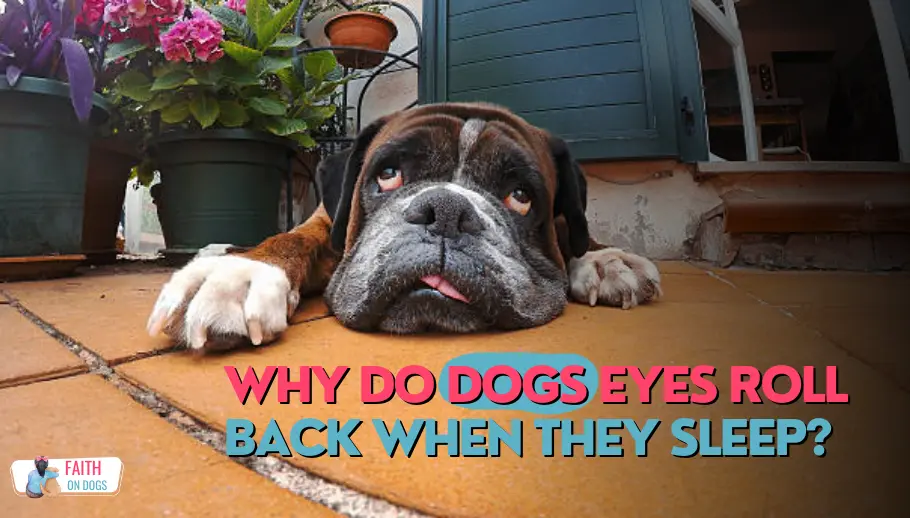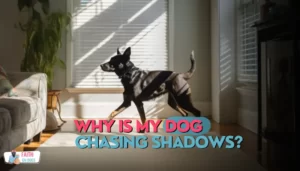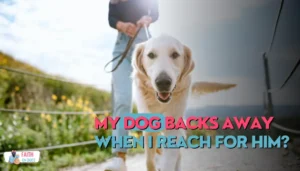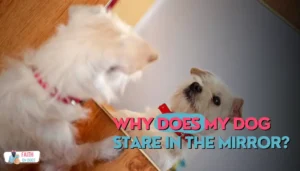
Do you have a curious pup at home? If so, then you’ve probably seen their eyes roll back when they’re sleeping. It’s pretty adorable to watch—especially if your pup is snoozing contentedly in the afternoon sun—but it also likely leaves you with one burning question: why do dogs eyes roll back when they sleep?
Well, here’s some good news: we’ve got answers! In this blog post, we’ll explore what makes a dog’s eyes “roll away” while they catch up on some essential zzzs, so keep reading to find out more about this behavior.
Here Are Reasons Why Dogs Eyes Roll Back When They Sleep
1. Dreaming
When a dog falls asleep, their eyes may roll back in their head as they enter a state of deep relaxation and rest. This is often accompanied by a process called REM (rapid eye movement) sleep, which is characterized by rapid movements of the eyes behind closed lids.
During REM sleep, dogs experience a type of sleep that is similar to the dreaming stage in humans. In this state, the brain becomes more active, and the body becomes paralyzed, allowing the dog to experience vivid and sometimes strange dreams.
This is why you may notice your dog twitching, moving their paws, or making noises while they sleep – they are likely reacting to the events of their dream.
For example, let’s say your dog is dreaming about chasing a squirrel. During this dream, you may notice their eyes rolling back in their head, their paws moving as if they are running, and possibly even a growling or barking noise coming from their throat. This is all normal and simply a sign that your dog is experiencing a vivid dream.
2. Seizures
Seizures are abnormal electrical activity in the brain that can cause a variety of physical symptoms, including involuntary movements and changes in behavior. In some cases, dogs may experience a seizure while they are sleeping, and their eyes may roll back as a result.
Here are some top veterinarian opinions on this behavior:
1. According to veterinary neurologist Dr. Kathryn Primm, “Eyes rolling back in the head during sleep can be a sign of seizure activity in the brain. This can occur due to various neurological conditions such as epilepsy or brain tumors.”
2. Dr. Melissa Mustillo, a veterinarian at the University of Pennsylvania School of Veterinary Medicine, adds that “if a dog’s eyes are rolling back during sleep, it is important to bring them to a veterinarian for evaluation. Seizures can be a serious medical condition that requires treatment.”
3. Dr. Jennifer Coates, a veterinarian, and author, states that “it is not uncommon for dogs to have their eyes roll back during sleep, but if this happens frequently or in combination with other signs of seizures such as muscle tremors or loss of consciousness, it is important to seek veterinary care.”
3. Third Eyelid
The third eyelid, also known as the nictitating membrane, is a thin, transparent membrane located on the inner corner of a dog’s eye. It is not always visible, but it can be seen when the dog is relaxed or asleep. The third eyelid serves several important functions for dogs, including protecting the eye from debris, keeping it moist, and helping to keep the eye clean.
When a dog is sleeping, the third eyelid may become more prominent as the eye relaxes and the dog’s muscles slacken. This can cause the dog’s eyes to appear as if they are rolling back into their head. This is a normal and natural reflex that occurs as the dog’s body enters a state of rest and relaxation.
4. Injury
I had a dog named Roxi who loved to sleep on his back with his legs spread out and his head thrown back. It was always amusing to see him in this position, and he seemed so content and at peace.
However, one day I noticed that his eyes were rolling back into his head while he slept. At first, I wasn’t sure what was happening, but as I watched him more closely, I realized that this was a normal part of his sleep cycle.
Over the next few days, I noticed that Roxi’s eyes were rolling back more and more frequently while he slept. I began to worry that something might be wrong with him, and I took him to the vet to get checked out. The vet told me that Roxi had suffered a minor injury to his eye and that the rolling back of his eyes was a common side effect.
The vet prescribed some medication for Roxi and told me to keep an eye on him to make sure that he was healing properly. I followed the vet’s instructions and made sure to give Roxi his medication on time. After a few weeks, I noticed that his eyes were no longer rolling back while he slept, and he seemed to be feeling much better.
Overall, I learned that dogs’ eyes could roll back while they sleep due to injury or other medical issues. If you notice this happening with your dog, it’s important to get them checked out by a veterinarian to ensure that they are healthy and receiving the proper treatment.
5. Nystagmus
Nystagmus is a condition in which the eyes make involuntary, rapid movements. This can occur when a dog is awake or asleep. It is often accompanied by dizziness, imbalance, and difficulty focusing on objects.
According to Dr. Matthew Breen, a professor of genetics at North Carolina State University, nystagmus is caused by a problem in the brain or inner ear that affects the way the eyes move. It can be inherited or acquired and can be caused by things like head injuries, brain tumors, and inner ear infections.
Dr. Karen Shaw Becker, a holistic veterinarian, explains that in dogs, nystagmus is often caused by vestibular disease, which is a problem with the balance center in the inner ear. This can be caused by inflammation, infection, or degeneration of the inner ear structures.
In most cases, nystagmus in dogs is a normal and harmless part of the sleep process and does not require any treatment. However, if your dog’s nystagmus is accompanied by other unusual symptoms or if it is excessive, it is always a good idea to consult with a veterinarian to rule out any underlying health issues.
6. Neurological Conditions
According to a study published in the Journal of Veterinary Behavior, dogs’ eyes rolling back during sleep is a neurological condition known as “eyelid closure myoclonus.” This condition is caused by involuntary muscle contractions that occur during the REM (rapid eye movement) stage of sleep.
The study found that this condition is more common in dogs that are older, have a history of brain injury or disease, or have a genetic predisposition for this condition. Dogs with eyelid closure myoclonus may also exhibit other symptoms, such as twitching or jerking of the limbs, facial muscles, or tail during sleep.
While eyelid closure myoclonus is not a very harmful condition, it can be disturbing for pet owners who may not be familiar with this behavior. If the condition is causing concern, it is recommended to consult with a veterinarian for proper diagnosis and treatment options.
7. Strabismus
Strabismus is a condition in which the eyes do not align properly, resulting in a misalignment of the visual axis. This can cause the eyes to appear crossed or to move independently of each other. Dogs with strabismus may have a hard time focusing on objects or may experience double vision.
According to Dr. Alice Jeromin, a veterinarian and eye specialist, dogs with strabismus may have a hard time keeping their eyes open when they sleep. As a result, their eyes may roll back in their sockets, leading to a characteristic closed-eye appearance when they are asleep.
Dr. Jeromin also notes that strabismus can be caused by various factors, including genetics, developmental abnormalities, and eye injuries. It can also be a symptom of underlying medical conditions such as brain tumors or neurological disorders.
Treatment for strabismus may involve corrective eyewear, surgery, or medication. It is important for pet owners to seek veterinary care if they notice any unusual eye movements or vision changes in their dogs. Early diagnosis and treatment can help prevent further vision loss or other complications.
8. Low Blood Pressure
When a dog falls asleep, their blood pressure naturally decreases. This is a normal physiological process that occurs in all mammals as they sleep. As the blood pressure decreases, the muscles in the face, including those around the eyes, relax. This can cause the eyes to roll back slightly in their sockets.
Additionally, some dogs may have more prominent or protruding eyes, which can cause them to roll back more easily when the muscles around the eyes relax.
Do You Know: Why Are Dogs Light Sleepers?
9. Cherry Eye
Cherry eye is a condition that affects the nictitating membrane, also known as the third eyelid, in dogs. This membrane is located in the inner corner of the eye and is responsible for protecting and lubricating the eye.
In dogs with the cherry eye, the gland that is responsible for producing lubricating secretions becomes enlarged and protrudes from the inner corner of the eye, giving the appearance of a cherry or a small red mass.
Cherry eye is most commonly seen in young dogs, particularly those with certain breeds such as bulldogs, pugs, and shih tzus. It can occur in one or both eyes and can cause a variety of symptoms, including redness and swelling of the eye, increased tearing, and difficulty closing the eye.
According to Dr. Mark Kittleson, a veterinarian, and professor of cardiology at the University of California, Davis, cherry eye is often caused by a congenital defect or weakness in the gland that leads to its prolapse. However, it can also be triggered by injury or infection.
Read About This Behavior: Why Dogs Falling Asleep While Standing Up?
10. Strokes
If a dog’s eyes roll back excessively or if it appears that they are having a seizure, it could be a sign of a stroke. A stroke is a sudden loss of brain function due to a disruption in blood flow to the brain. There are two types of strokes that can occur in dogs:
- Ischemic stroke: This type of stroke is caused by a blockage or clot in the blood vessels leading to the brain. This prevents oxygen and nutrients from reaching the brain and can cause damage to brain cells.
- Hemorrhagic stroke: This type of stroke is caused by bleeding in the brain. This can be due to a ruptured blood vessel or an aneurysm (a weak spot in a blood vessel that bulges and can burst). Hemorrhagic strokes are usually more severe and can cause more damage to the brain.
If you suspect that your dog is experiencing a stroke, it is important to seek veterinary care immediately. Strokes can be treated with medications and other therapies, but early intervention is key to improving the chances of recovery.
Interesting Article: Why Dogs Sleep With Their Tongue Out?
Final Thoughts
We hope this article has provided some insight into the mysterious behavior of dogs rolling their eyes back when they sleep. It is normal for a dog’s eyes to roll back when they are sleeping.
It is not a cause for concern unless the dog’s eyes roll back excessively or if the dog is experiencing other unusual symptoms.




